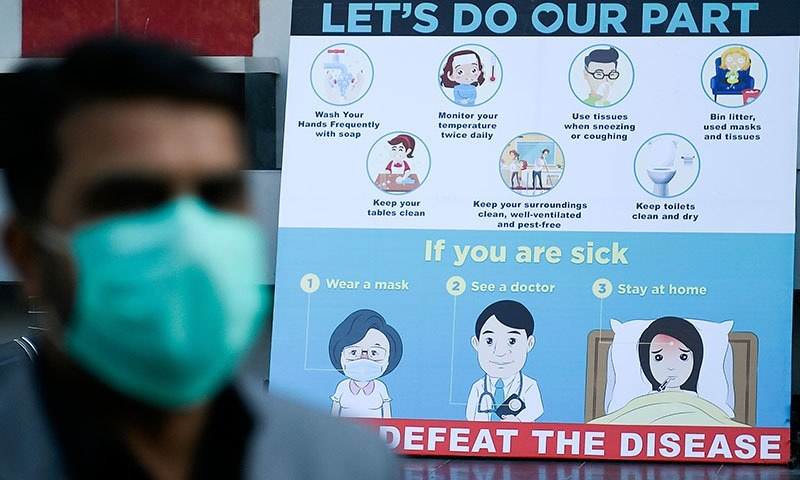ISLAMABAD: A study conducted in 25 cities shows that almost 11 per cent of Pakistanis have developed protective immunity across the country against coronavirus.
The “National Seroprevalence Study” was initiated in July this year by the Health Services Academy in collaboration with multiple partners, including Aga Khan University, and with technical support from the World Health Organisation (WHO).
It is part of the WHO Unity Study being conducted simultaneously in 25 other countries, the Ministry of National Health Services said in a statement on Thursday.
Seroprevalence studies are carried out with an objective to assess as to what percentage of population has developed protective immunity (antibodies) to the virus.
“The seropositivity was more in urban areas compared to rural areas; similarly those who had contact with Covid-19 positive person were more likely to have antibodies in their blood,” the study stated.
Ministry says process for Covid vaccine fast-tracked
It reveals that the population of urban areas and people up to middle age are more protected against the disease. However, population in rural areas and senior citizens are at highest risk from a possible second wave of the deadly virus.
The virus was more common in young adults and significantly less in children and older people. It was also found out in the study that the use of mask and frequent hand-washing in July was up to approximately 60pc and 70pc of population, respectively. This finding underscores the importance and success of the awareness campaigns carried out in earlier months.
The study suggests that areas with lower immunity rates may be at higher risk for future outbreaks. “Hence there is a need for enhanced sentinel site surveillance and ramping up of health facilities for Covid-19 treatment particularly in rural districts.”
Talking to Dawn, microbiologist Prof Dr Javed Usman said detection of antibodies in 11pc population was much less than his expectations as it meant that Pakistan was still far away from the concept of herd immunity.
“The concept of herd immunity arises if antibodies are developed in over 50pc population. Although 22 million people have been infected with the virus, it does not mean that all of them needed medical treatment as it is called ‘Sub-Clinical Infection’ in which patients may have minor symptoms or no symptoms. We know that in Pakistan a large number of people are asymptomatic. However, study shows that 89pc of population have no exposure to virus and they can be infected in second wave of virus,” he said.
Prof Usman said that the ratio of antibodies also depended on the sensitivity of testing, but 89pc people were still vulnerable to the deadly virus.
A health expert, who played a role in the study, said on condition of anonymity that the health ministry had shared preliminary findings and a number of findings would be shared within three to four weeks.
“There were around 80 variables of the study as primary target was to find the percentage of antibodies in the masses. Other targets were to identify that which age group was vulnerable, identify the ratio of cases in rural and urban areas and small and big cities, people of which profession were more vulnerable, what kind of symptoms were in them and if people were following the precautionary measures and wearing masks,” he said.
He said that one of the findings was that the initially people were strictly following the standard operating procedures (SOPs), but later they stopped doing that.
“It was also a finding that the media campaign was very successful and there is a need to launch another media campaign so that people again start following the SOPs. It is also suggested that such study will be conducted after every two months,” he said.
In reply to a question, the health expert said that the sample size should not be considered as the confidence interval of study was 95pc due to so many variables. He said the vaccines will be given to the most vulnerable segments of society and in most vulnerable areas, identified through the study.
Meanwhile, the federal government has fast-tracked the process for provision of Covid-19 vaccine as soon as it is available.
“An expert committee had been tasked under the auspices of National Covid-19 Vaccine Committee with working on finalising recommendations for provision of the vaccine and its deployment in the country. The committee’s recommendations shall be submitted to the prime minister this month,” the Ministry of National Health Services said.
“Six out of 10 vaccines currently being developed by leading global manufacturers are undergoing phase-3 trials. The committee has recommended engagement with Global Alliance for Vaccines and Immunisation for support in procurement through co-financing. It has also been recommended to the government to arrange finances for the purpose. Also among the recommendations is enhanced collaboration with China including in clinical trials of the vaccine and efforts towards indigenous manufacturing of the vaccine,” the ministry said.
Published in Dawn, August 21st, 2020














































